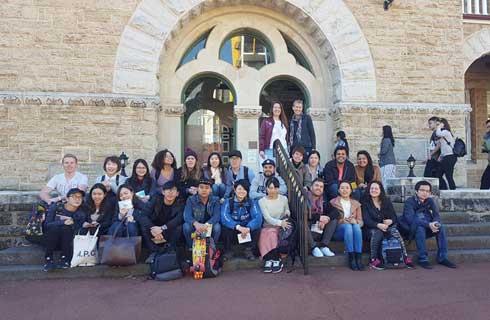Juris Doctor - Civil Litigation (Accelerated)

学历文凭
Juris Doctor

专业院系

开学时间

课程时长

课程学费

国际学生入学条件
Transcripts and Recommendations - You'll need to submit all college and graduate school transcripts and at least two letters of recommendation through LSAC's Credential Assembly Service (CAS). You must register for this service separately. Letters of recommendation must be sent through LSAC. Letters will not be accepted if sent directly to the Office of Law Admission.
Resume - Applicants are required to submit an updated resume with their application. Upload your resume as part of the LSAC.org application to Suffolk Law School. Any gaps in employment or education should be noted and explained in a separate addendum submitted with the personal statement.
Personal Statement - Upload your personal statement (essay) as part of the LSAC application to Suffolk Law School.
Letter of Recommendation - Submit at least two letters of recommendation (no more than three) through LSAC's Credential Assembly Service (CAS). A recommendation should come from a college professor if you have graduated from college within the past three years. If you have been out of school longer than three years, your recommendation may come from a professional source. Letters of recommendation should never come from family member or friends. Letters of recommendation must be sent through LSAC. Letters will not be accepted if sent directly to the Office of Law Admission.
Official Academic Transcript -Register for LSAC's Credential Assembly Service (CAS). You must register for this service separately. This service authenticates all transcripts and recommendations. This is also how we receive your LSAT score(s). You must submit transcripts for all collegiate, graduate and professional study. This is also how we receive your LSAT score(s). Official copies of transcripts for all collegiate, graduate and professional study by the applicant must be sent directly to LSAC from the college or graduate school. Applicants who are still attending an undergraduate institution should submit all transcripts up to the most recent semester completed. All new students must provide a final transcript evidencing a bachelor's degree conferred. This is an ABA requirement.
Although the Law School considers each application in its entirety, applicants with the highest likelihood of admission to the Law School will have attained a score of at least 80 (internet based) or a score of 6.5 on IELTS.
IDP—雅思考试联合主办方

雅思考试总分
6.5
- 雅思总分:6.5
- 托福网考总分:80
- 托福笔试总分:160
- 其他语言考试:PTE-Academic (Pearson Test of English). A minimum score of 65 is required to be considered for full admission.
CRICOS代码:
申请截止日期: 请与IDP联系 以获取详细信息。
课程简介
相关申请
 预科
预科 奖学金
奖学金 实习机会
实习机会 在校学习
在校学习 跨境学习
跨境学习 校园授课-线上开始
校园授课-线上开始 在线/远程学习
在线/远程学习
开学时间&学费
学费信息仅供参考,请与IDP联系以获取详细信息
| 开学时间 | 时长 | 学费 | 地点 |
|---|
关于萨福克大学

萨福克大学是一所历史悠久的四年制私立大学,吸引了来自美国和世界各地各种文化背景的学生。该校开设有在全美受到认可的课程,以体验式学习为重点,通过小班教学和良好的职业联系培养学生的领导能力。萨福克大学位于波士顿市中心,提供60多个研究领域的本科课程、50多个研究生学位课程、30多个证书课程和继续教育机会,并通过萨福克大学法学院提供高级法学硕士和法学博士课程。此外,学校还为学生提供大量的海外学习机会、全球旅行研讨会以及由教师带队的游学团,让学生能够进行国际学习。萨福克大学的学生可以接触到波士顿金融、医疗保健、生物技术、初创企业、政府、非营利组织以及视觉和表演艺术等领域的顶级雇主。他们可以在有影响力的机构实习,与专业导师建立牢固而有用的联系,鼓励毕业后就业。课堂学习还辅以全市各地的体验式学习机会,为毕业生的成功做好准备。学生在城市校园中学习,校园由教学楼和宿舍楼组成,所有建筑都在十分钟步行半径之内。世界一流的设施包括最先进的教室和实验室、田径场和运动场、重新设计的艺术工作室和教室,以及其他一些经过翻新的资源,以提升学生的学习体验。波士顿为学生社区提供了很多便利。从校园步行 15 分钟以内,学生就能找到大联盟的体育场馆、剧院、音乐场所、咖啡馆、餐馆、博物馆、公交车站和风景优美的海港。
本校相关课程

工商管理理学学士-会计
学历文凭
Bachelor Degree
开学日期
课程费用总额


广告学学士
学历文凭
Bachelor Degree
开学日期
课程费用总额


广告学学士
学历文凭
Bachelor Degree
开学日期
课程费用总额


Bachelor of Science in UnderGraduate Law/Legal Studies
学历文凭
Bachelor Degree
开学日期
课程费用总额


Bachelor of Arts in UnderGraduate Law/Legal Studies
学历文凭
Bachelor Degree
开学日期
课程费用总额


Associate of Science in Paralegal Studies
学历文凭
Associate Degree
开学日期
课程费用总额

其他相关课程

法学学士[一般]
 滑铁卢大学
滑铁卢大学学历文凭
Bachelor Degree
开学日期
课程费用总额


人类研究哲学博士
 劳伦森大学
劳伦森大学学历文凭
Ph.D.
开学日期
课程费用总额


人类动力学硕士
 劳伦森大学
劳伦森大学学历文凭
Masters Degree
开学日期
课程费用总额


律师助理研究生证书
 德恒学院
德恒学院学历文凭
Graduate Certificate
开学日期
课程费用总额


调解研究生证书-替代性纠纷解决
 德恒学院
德恒学院学历文凭
Graduate Certificate
开学日期
课程费用总额


人权文学士
 温尼伯大学
温尼伯大学学历文凭
Bachelor Degree
开学日期
课程费用总额










 美国
美国